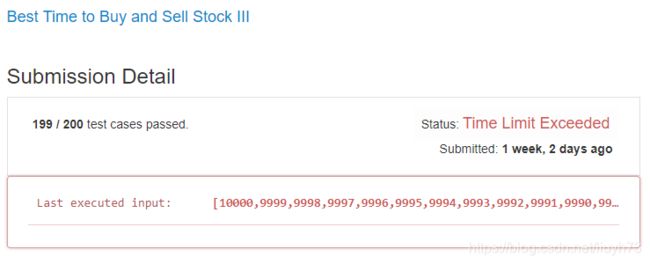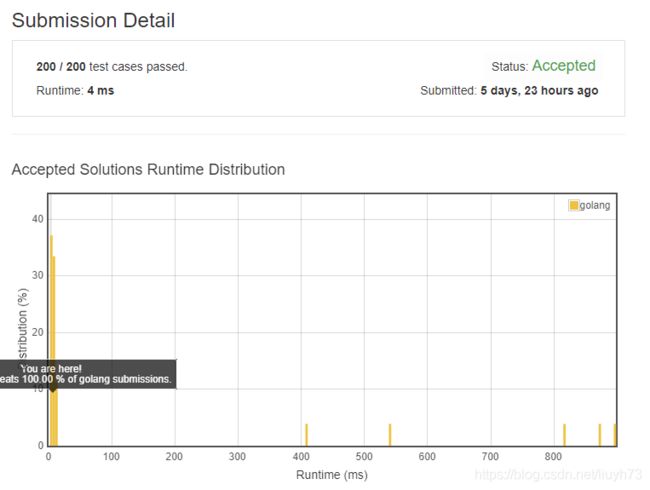leetcode | 123. Best Time to Buy and Sell Stock III
题目
Say you have an array for which the ith element is the price of a given stock on day i.
Design an algorithm to find the maximum profit. You may complete at most two transactions.
Note: You may not engage in multiple transactions at the same time (i.e., you must sell the stock before you buy again).
Example 1:
Input: [3,3,5,0,0,3,1,4]
Output: 6
Explanation: Buy on day 4 (price = 0) and sell on day 6 (price = 3), profit = 3-0 = 3.
Then buy on day 7 (price = 1) and sell on day 8 (price = 4), profit = 4-1 = 3.
Example 2:
Input: [1,2,3,4,5]
Output: 4
Explanation: Buy on day 1 (price = 1) and sell on day 5 (price = 5), profit = 5-1 = 4.
Note that you cannot buy on day 1, buy on day 2 and sell them later, as you are
engaging multiple transactions at the same time. You must sell before buying again.
Example 3:
Input: [7,6,4,3,1]
Output: 0
Explanation: In this case, no transaction is done, i.e. max profit = 0.
思路与解法
从题目可知,我们可以先计算第一次买卖股票所获得收益,进行保存,然后再计算买卖第二次买卖股票的收益(与第一次不冲突)加上第一次买卖股票的收益最终取最大值即可。
方法一:
我们可用dp[i][1]表示第i天为止进行一次买卖股票的最大收益;dp[i][2]表示第i天为止进行两次买卖股票的最大收益。
代码实现
func max(a, b, c int) (maxx int) {
maxx = a
if maxx < b {
maxx = b
}
if maxx < c {
maxx =c
}
return
}
func maxProfit(prices []int) int {
days := len(prices)
dp := make([][]int, 0)
for i:=0; i<=days; i++ {
dp = append(dp, make([]int, 3))
}
for i:=1; i<=days; i++ {
// 第i天第一次买卖股票的收益默认为前一天的收益
dp[i][1] = dp[i-1][1]
// 以第j天为分界线,在[1~j-1]天寻找第一天收益 + 区间[j+1~i]第二天收益的最大值
// dp[i][2]存储第i天为止进行两次股票买卖的最大值。
for j:=1; j<i; j++ {
if prices[i-1] - prices[j-1] > dp[i][1] {
dp[i][1] = prices[i-1] - prices[j-1]
}
for k:=j+1; k<i; k++ {
if dp[j][1] + prices[i-1] - prices[k-1] > dp[i][2] {
dp[i][2] = dp[j][1] + prices[i-1] - prices[k-1]
}
}
dp[i][2] = max(dp[i][2], dp[i-1][2], dp[i][1])
}
}
return dp[days][2]
}
运行结果
上述代码实现效率很低, O ( N 3 ) O(N^3) O(N3)

方法二:
换一种思路,我们可以首先顺序计算,得到第i天为止进行一次股票买卖的最大收益保存为f[i];然后倒序计算maxx - prices[i] + f[i-1]的最大值(maxx初始值为prices[days-1],maxx保存的是股票的最大价值,详情见下方代码),即为两次股票买卖的最大收益。
代码实现
func max(a, b int) int {
if a < b {
return b
}
return a
}
func maxProfit(prices []int) int {
days := len(prices)
if days == 0 {
return 0
}
f := make([]int, days)
minn := prices[0]
maxx := prices[days-1]
sum := 0
// f[0]收益为0,所以无需计算
for i:=1; i<days; i++ {
if prices[i] > prices[i-1] {
f[i] = max(f[i-1], prices[i] - minn)
} else {
f[i] = f[i-1]
}
if prices[i] < minn {
minn = prices[i]
}
}
// 两次股票买卖的最大收益为max(sum, maxx - prices[i] + f[i-1])
for i:=days-1; i>0; i-- {
maxx = max(maxx, prices[i])
if maxx - prices[i] > 0 {
sum = max(sum, maxx - prices[i] + f[i-1])
}
}
// 注意处理边界问题
if maxx - prices[0] > 0 {
sum = max(sum, maxx - prices[0])
}
return sum
}
